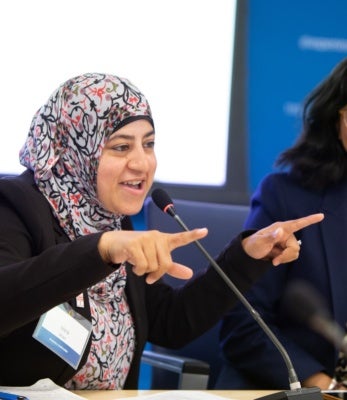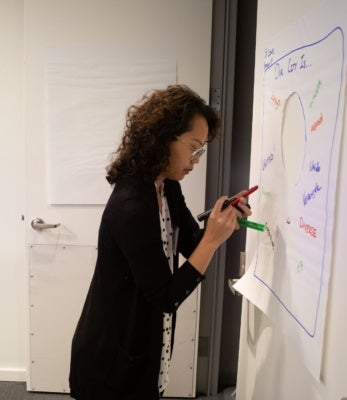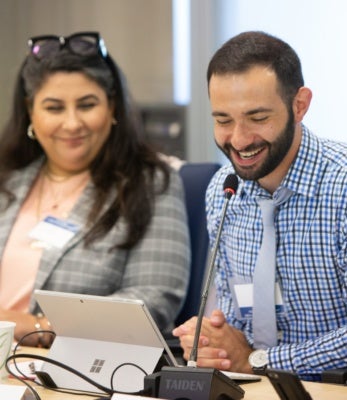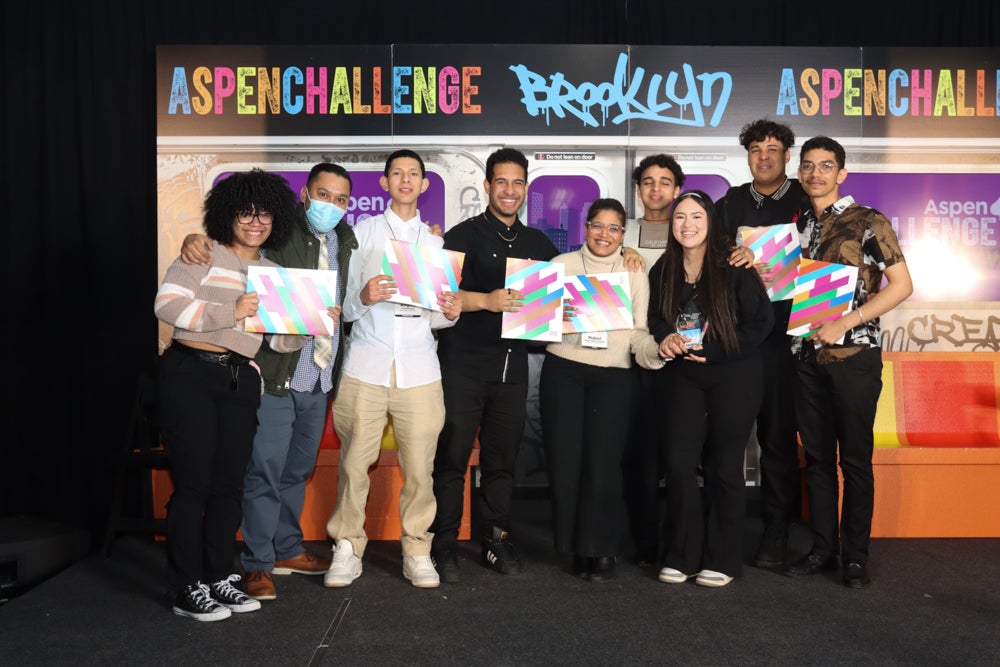With hate and violence targeting faith communities and houses of worship at alarming rates across the United States, often mayors and elected officials are those who stand alongside first responders with messages of inclusion and peace. This has been true in countless incidents of arsons and vandalisms at American mosques. Local government leaders have also been on the frontlines responding to devastating shootings at a Wisconsin Sikh temple in 2012, a Charleston church in 2015, and a Poway synagogue earlier this year.
When not responding to crises impacting faith communities, public officials are engaged with religious institutions which serve as refugee resettlement and immigrant integration centers, hosts of afterschool programs, social service providers for homeless populations and disaster relief organizers. Despite the many ways public servants in local government are brought into contact with America’s religiously diverse faith communities, very few have access to ongoing religious and cultural literacy training, guidance on inclusive policy making, and peer to peer support. In response to this need, the Aspen Institute’s Inclusive America Project has partnered this year with America Indivisible and the Freedom Forum Institute’s Religious Freedom Center to launch the Public Leaders for Inclusion Council.
Usra Ghazi (America Indivisible) discusses the origins of the Public Leaders for Inclusion Council.
 This new leadership development program seeks to equip city, county and state public servants with the tools and resources necessary to combat racialized anti-Muslim bigotry and other forms of hate within local communities across the United States. The Council also serves as a peer-to-peer network, facilitates the exchange of resources and knowledge between public officials and builds capacity to address ongoing issues of Islamophobia, hate, and exclusion. The Council’s inaugural cohort of 25 city, county and state officials began its program in May and recently gathered for a summit at the Aspen Institute as well as the Freedom Forum Institute’s Newseum in Washington, D.C.
This new leadership development program seeks to equip city, county and state public servants with the tools and resources necessary to combat racialized anti-Muslim bigotry and other forms of hate within local communities across the United States. The Council also serves as a peer-to-peer network, facilitates the exchange of resources and knowledge between public officials and builds capacity to address ongoing issues of Islamophobia, hate, and exclusion. The Council’s inaugural cohort of 25 city, county and state officials began its program in May and recently gathered for a summit at the Aspen Institute as well as the Freedom Forum Institute’s Newseum in Washington, D.C.
Hailing from 18 states and the District of Columbia, the Council represents a diverse array of religious, ethnic, racial and geographical identities. Eighteen of the Council’s 25 participants identify as women, and 13 identify as women of color. Among the 2019 cohort, notable participants include the Honorable Jeffrey Zane Slavin, mayor of Somerset, Md., and the Honorable Ahmad Alaswad, the first Muslim, Arab American chief of staff to a county commissioner in Fort Bend County, Texas.
Andrea Cervone, city council member in Clarkston, GA talks to Zeenat Rahman (Inclusive America Project) about how she responds to concerns about Sharia law coming to her town.
Naheed Murtaza, Owensboro Kentucky Human Relations Commissioner, discusses her motivation for joining a local government commission and some of the challenges that come along with this work.
 During their time in D.C., these leaders engaged with experts in media, messaging, domestic and foreign affairs, Islamophobia and interreligious engagement. They conducted a site visit to the Church of the Epiphany which for years has served as a host site for Friday prayers for D.C. based Muslims who lack a traditional house of worship in the downtown area. These leaders also heard from experts and scholars studying the dual phenomena of pluralism and polarization across the U.S. including the Inclusive America Project’s executive director, Zeenat Rahman.
During their time in D.C., these leaders engaged with experts in media, messaging, domestic and foreign affairs, Islamophobia and interreligious engagement. They conducted a site visit to the Church of the Epiphany which for years has served as a host site for Friday prayers for D.C. based Muslims who lack a traditional house of worship in the downtown area. These leaders also heard from experts and scholars studying the dual phenomena of pluralism and polarization across the U.S. including the Inclusive America Project’s executive director, Zeenat Rahman.
Zeenat Rahman (Aspen Inclusive America Project) talks about the importance of religious literacy and promising models for challenging anti-Muslim bigotry with Dalia Mogahed (ISPU).
Dalia Mogahed (Institute for Social Policy and Understanding) speaks about the three threats to American Democracy posed by Islamophobia, with Zeenat Rahman.
Rachel Deitch (American Humanist Association) discusses the Humanist community and ways that they stand up for religious minorities in the U.S.
 Major national organizations engaged with networks of elected officials have made strides in recognizing the importance of addressing racism in bigotry in American communities. The National League of Cities launched the Race, Equity and Leadership (REAL) initiative in 2014 and the U.S. Conference of Mayors launched the Center for Inclusive and Compassionate Cities in 2018. The Public Leaders Council brings these critical discussions about race, equity, inclusion and anti-Muslim bigotry to grasstops leaders serving as chiefs of staff and city commissioners, as councilmembers and city clerks.
Major national organizations engaged with networks of elected officials have made strides in recognizing the importance of addressing racism in bigotry in American communities. The National League of Cities launched the Race, Equity and Leadership (REAL) initiative in 2014 and the U.S. Conference of Mayors launched the Center for Inclusive and Compassionate Cities in 2018. The Public Leaders Council brings these critical discussions about race, equity, inclusion and anti-Muslim bigotry to grasstops leaders serving as chiefs of staff and city commissioners, as councilmembers and city clerks.
Usra Ghazi (America Indivisible) discusses with Zeenat Rahman (Inclusive America project) her hopeful vision for the future of anti-bigotry work in U.S.
These leaders are already dealing with the challenges of hate and bigotry in the communities they serve and while many are models for inclusion and pluralism, there is much work ahead to ensure our cities, counties, and states are truly indivisible.
For more information about the Public Leaders for Inclusion Council and a full list of this year’s participants, visit americaindivisible.org/plc. To apply for the Public Leaders for Inclusion Council 2020 (applications due March 8, 2020), visit https://www.americaindivisible.org/apply-now.
Usra Ghazi is the Director of Policy and Programs at America Indivisible and a Senior Fellow at the Religious Freedom Center.
The Inclusive America Project is committed to advancing a thriving U.S. Religious Pluralism and believes an important step to achieving this goal is sharing diverse voices and ideas across our platforms. In this spirit, we are pleased to publish blogs written by external authors working in and around the space.
This article was written in August 2019 following the inaugural gathering of the Public Leaders for Inclusion Council 2019. The views and opinions expressed in this blog do not necessarily reflect those of the Aspen Institute.


